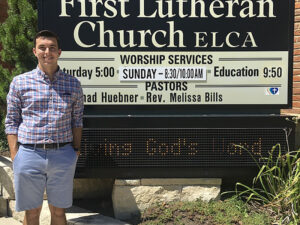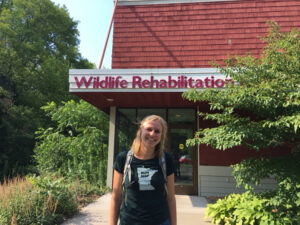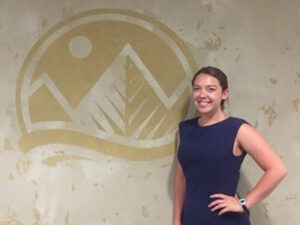Contact Information
Rachel Brummel
Associate Professor of Environmental Studies/Political Science
Valders 372E
700 College Drive
Decorah, IA 52101
Phone: 563-387-1778
When pursuing environmental studies at Luther, you’ll acquire the resources and knowledge to understand the complex and dynamic relations between humans and the natural world.
The program integrates perspectives from the social sciences, natural sciences, and humanities to develop the conceptual and analytical skills required for a balanced approach to environmental issues. You’ll also gain depth of knowledge in one specific area of study through a concentration.
As a graduate of the Environmental Studies Program, you will:
- Demonstrate understanding of the structure and function of biological ecosystems and the ways humans are dependent upon ecosystem services. (BIO 151)
- Understand the structure and function of the Earth’s systems and the history of stability and change within these systems over geologic time (The Earth System)
- Demonstrate understanding of various social systems such as political and economic systems and the tradeoffs associated with different social arrangements. (Environmental Politics and Policy)
- Understand the ways humans have imagined and narrated their relationships with the Earth and the values and cultures that have informed that relationship (Environmental Philosophy)
- Recognize the range and implications of environmental issues confronting contemporary societies and critically evaluate possible solutions to these issues (critical thinking)
- Comprehend systems dynamics, including feedbacks, limits, and response times, and the ways human systems can and do threaten natural systems (systems thinking)
- Identify, evaluate, and integrate sources of information from multiple perspectives in order to understand environmental problems (information literacy)
- Integrate knowledge and methodologies from different disciplines to propose creative solutions to real world problems (interdisciplinary problem solving)
- Demonstrate competency in the ability to use and analyze data (quantitative literacy)
- Gain the ability to work collaboratively in small groups
- Understand how to utilize tools for social change
- Demonstrate the capacity to communicate effectively both orally and in writing
- Reflect on the relationship between personal values, individual choices, and sustainability
- Manifest virtues such as empathy, respect for all life, and humility in personal responses to environmental problems
- Articulate a positive and hopeful vision for just and sustainable societies throughout the world and for future generations
Study Plans and Advising
From biology to philosophy, geology to economics, environmental studies is a truly interdisciplinary and engaged course of study. Many of our courses utilize the local area for intensive study beyond the classroom, and all of our students are encouraged to broaden their horizons through study abroad. A complete listing of environmental studies courses can be found in the college catalog.
Please note that the majority of courses that count for the environmental studies major and minor do not carry the ENVS prefix. Rather, they are listed in their respective departments. On this site, we strive to provide up to date information on all courses for the ES program being offered each term. If you have questions about specific courses, please email the program director with your question.
Policy Track
Science Track
Culture & Society
Individualized
View advising documents related to the Environmental Studies Program:
Applied Learning
The Environmental Studies Program has numerous opportunities available for hands-on learning.
Students interested in environmental studies often combine that interest with their desire to have an off-campus experience. Studying off campus can enable students to study the environment from the perspective of another culture or in a different natural setting. A study-away experience can also give students the opportunity to take courses that are not offered at Luther.
Semester Programs
The environmental studies major typically offers students the flexibility to spend an entire semester off campus. During Luther’s Rochester Semester and Washington Semester, students complete four-day-a-week internships, which can be directly tailored to a student’s interest, for example in environmental policy or environmental non-profit work. Many students also choose to study abroad, for example with Luther’s partner program at Telemark University in Norway. More detailed information on these and other semester-long study away opportunities can be found at the Center for Global Learning.
January Term Courses
Luther offers a wide range of January Term courses each year. Some of the recent offerings include:
- Biology 140/240: Ecology of the Southwest
- Biology 249/ENVS 249: Winter Biology and the Winter Environment
- ENVS 240: Environmental Policy in the Pacific Northwest
- Paideia 450: People and Parks: Pastoralism and Conservation in East Africa
Luther offers many opportunities for students to engage in research with faculty in environmental studies. In areas ranging from history and policy to ecology and climate science, Luther students gain firsthand experience researching pressing environmental issues. Supported by the Office of the Provost and by grants from the National Science Foundation, the U.S. Environmental Protection Agency, the Margaret A. Cargill Foundation and other organizations, dozens of environmental studies majors have spent a summer doing intensive research. For more information on applying for summer research, contact the program director.
A sampling of recent summer research projects completed by environmental studies students:
- Soil carbon storage on agricultural and natural lands (Ryan Rogers ’22 and Matt Staver ’20, with Dr. Laura Peterson, environmental studies and chemistry)
- Examination of drug-resistant bacteria in Decorah’s springs, streams, and rivers. (Max Eness ’20 with Dr. Eric Baack, biology)
- Resilience of NE Iowa communities in the face of flooding (Halina Pyzdroski ’18 with Dr. Rachel Brummel, environmental studies and political science; Dr. Carly Foster, political science; and Dr. Jon Jensen, environmental studies and philosophy)
Luther faculty who research topics related to environmental studies:
- Anita Carrasco (Anthropology)
- Eric Baack (Biology)
- Jodi Enos-Berlage (Biology)
- Kirk Larsen (Biology)
- Beth Lynch (Biology)
- Molly McNicoll (Biology)
- Dawn Reding (Biology)
- Brad Chamberlain (Chemistry)
- Laura Peterson (Chemistry and Environmental Studies)
- Steve Holland (Economics and Business)
- David Faldet (English)
- Andrew Hageman (English)
- Richard Bernatz (Mathematics)
- Jon Jensen (Philosophy and Environmental Studies)
- Rachel Brummel (Political Science and Environmental Studies)
- James Martin-Schramm (Religion)
Recent publications
(*denotes Luther student co-authors)
Peterson, L. C., Lawrence, K. T., Herbert, T. D., Caballero‐Gill, R., Wilson, J., *Huska, K., Miller, H., Kelly, C., Seidenstien, J., *Hovey, D., & *Holte, L. (2020). Plio‐Pleistocene Hemispheric (A)Symmetries in the Northern and Southern Hemisphere Midlatitudes. Paleoceanography and Paleoclimatology, 35(3): e2019PA003720.
Brummel, B. 2016. Mobilizing place: examining mobility, identity, and boundary in the politics of Asian carp. Journal of Environmental Studies and Sciences 6:765-769.
Carrasco, A. 2016. A biography of water in Atacama, Chile: two indigenous community responses to the extractive encroachments of mining. Journal of Latin American and Caribbean Anthropology 21:130-150.
Herbert TD, Lawrence KT, Tzanova A., Peterson LC, Caballero-Gill R, Kelly CS. 2016. Late Miocene global cooling and the rise of modern ecosystems. Nature Geoscience 9: 843-847.

Liam Fraser
When: Summer 2017
Where: Iowa Interfaith Power and Light in Decorah, Iowa
Major: Environmental Studies
Liam organized a clean energy tour around Decorah and promoted clean energy with the help of local leaders, during his summer internship with Iowa Interfaith Power and Light in Decorah, Iowa. Two local congregations hosted tour stops where Fraser helped highlight their efficiency and clean energy investments. He also organized meetings with local energy leaders to discuss possible involvement in the project. Liam learned how unifying the topic of energy can be in a small community like Decorah. “Everyone relies on energy to go about their days, so determining ways to improve efficiency often brings people together…[t]his internship allowed me to become more comfortable reaching out to various community members and marketing an event to a specific target audience,” he said. Upon graduation, Liam will look into working for organizations such as Iowa Interfaith Power and Light or the Winneshiek Energy District. He believes developing community clean energy should be a national priority. The experience he has gained has inspired him to consider applying for graduate school.

Anna Ryden
When: Summer 2017
Where: The Wildlife Rehabilitation Center of Minnesota, Roseville, MN
Major: Environmental Studies and Biology
Anna spent her summer interning at the Wildlife Rehabilitation Center of Minnesota (WRC). There, she assisted with the rehabilitation of animals and observed their development. She worked primarily in the mammal nursery, where she fed and cleaned the cages of baby mammals. Anna not only kept track of the needs of the different animals, she also spent time preparing the animals for their eventual release back into the wild. The internship taught her how to care for animals and monitor their development. The goal of the WRC to educate the community and protect the environment moved Anna. She loved watching the animals heal at the center, and this experience made her more interested in working with animals in the future.

Meghan Barker
When: Summer 2016
Where: The Wilderness Society, Washington, D.C.
Majors: Political Science, Environmental Studies
Over the summer, Meghan interned at The Wilderness Society in Washington, D.C. She attended Congressional hearings and learned about public land policies. One issue she worked on included the maintenance of national parks. This was interesting to Meghan because, the year prior, she had spent the summer at Glacier Bay National Park in Alaska. She had seen firsthand the impacts of this issue. Being able to examine environmental policies during both experiences helped Meghan understand them better. Washington, D.C. also gave her an alternative perspective from the one she had had while in Alaska. This new framework taught Meghan that it is important to have diverse experiences. Hers have continued to shape her understanding of the work that goes into preserving the environment. Meghan plans on using this knowledge to defend policies that protect public lands.
Meet students from the Environment and Community seminar course and read how they worked in pairs to produce podcasts about current environmental issues.
Environmental Podcasting
The Project: Students in assistant professor Rachel Brummel’s Environment and Community seminar worked in groups of two to produce podcasts about environmental issues ranging from sustainable transportation in the suburbs to the tiny house movement to frac sand mining. The students conducted research, interviewed people, wrote scripts, and learned to record and edit audio.
The Group: Laura Proescholdt ’16 and Amy Thor ’17
Lively Learners
Brummel loves group work: “My overarching goal in assigning collaborative work is to cultivate a community of learners in the classroom. My hope is to create an environment where students experience both the joy and creativity of joint inquiry—and where they’re challenged by working with others.” Group projects, Brummel believes, teach students to work through conflict and differing visions—and the final product is often better because of its collaborative nature.
Plus, she says, when students are working in groups, “Everything is more lively and engaged. There is more chatting before, during, and after class. When students have a shared experience—even if they are working in different groups—it unites them, gives them the opportunity to share insights and tips, and gives them a common language.
Students Teach Each Other
Senior Laura Proescholdt and junior Amy Thor worked as a team to create a podcast exploring the role of hope in environmental education and action. Thor sees value in collaborative work, especially in upper-level classes: “I think as students move to more advanced courses and are more intensely involved with their major, there is a lot to be gained from group work. In upper-level classes there is a great opportunity to interact with and learn from fellow students in the major. Plus, students most likely have a similar background and understanding of problems since they have probably taken similar classes in the past.”
Two’s a Pair
For Proescholdt, two was the magic number: “I would highly recommend groups of two because both members are equally accountable, and it is easier [than in a larger group] to find someone with the same excitement and commitment to the topic you’re exploring.”
She continues, “I appreciated the new ideas and perspectives Amy brought to the project. It was also nice—especially during an extended project like this—to get to know someone new and laugh about the challenges we encountered along the way.”
Crafting a Way Forward—Together
Brummel says that collaboration is the norm in environmental action, which “draws upon multiple disciplines—biology, political science, philosophy—to understand issues and craft ways forward. Whether working for the DNR on invasive species, for the Nature Conservancy on private land management, or Target on corporate sustainability, collaboration is a key element of working for the environment.”
Facilities
Luther’s environmental studies program is truly interdisciplinary, which means that students take courses all across campus, from biology classes in the state of the art Sampson Hoffland Laboratories to sociology classes in Koren, the college’s stately old library. Beyond any four walls, environmental studies students use the world as their classroom, spending lots of time outside whether studying water quality in the Upper Iowa River or learning about sustainable agriculture on a local farm.
Offices for the Environmental Studies Program are located in the Valders Hall of Science, 3rd floor. Valders was renovated to LEED standards in 2009 and provides geology labs, an environmental education classroom, and a dedicated GIS computer lab, in addition to lots of space for students to connect with their classmates and professors.
Adjacent to Valders is the Sampson Hoffland Laboratories which serves as a model for sustainable construction and was awarded a LEED Gold rating by the US Green Building Council in 2009. Sampson Hoffland houses chemistry and biology and is the college’s newest building. A special emphasis was placed on creating space for student/faculty research. For more information about Sampson Hoffland’s green design and sustainability features, visit Luther’s Center for Sustainable Communities.
Outside the traditional classroom, Luther offers distinctive natural areas for study of environmental issues. The Luther campus consists of 1,000 acres of land with many diverse ecosystem types. Many of these areas are accessible by trails and classes often use these areas. Anderson Prairie is just five minutes walk from our classrooms. For a description of some of these areas visit the Campus Natural Areas page.
Contact Information
Rachel Brummel
Associate Professor of Environmental Studies/Political Science
Valders 372E
700 College Drive
Decorah, IA 52101
Phone: 563-387-1778